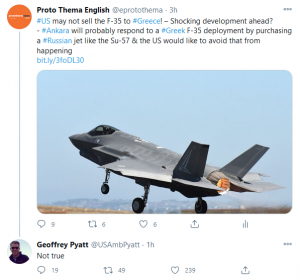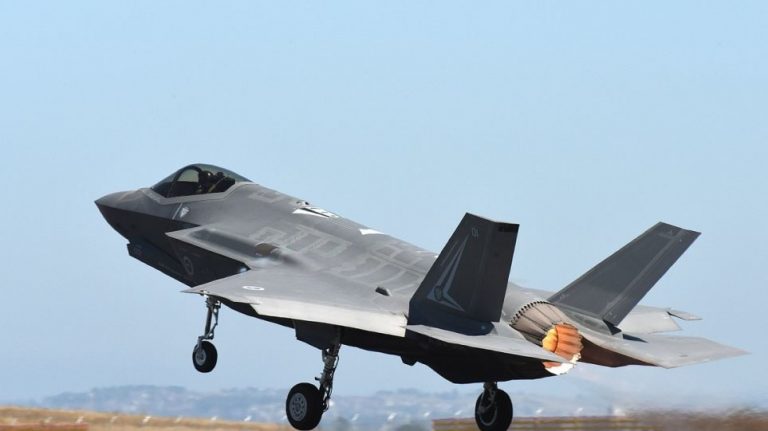UPDATE: In response to the article by Military Watch we republished, the US Ambassador to Greece, Geoffrey R. Pyatt, commented on Twitter that it’s “not true” that the US may not sell the F-35 to Greece for the reasons mentioned in the report.

————————————————————————————————————-
According to a report by Military Watch, among other concerns, the US would not like to see the balance in the Eastern Mediterranean change in favour of Greece nor would they like to see Turkey moving closer to Russia.
Here is the full report:
Amid mounting pressure on Turkey in the Eastern Mediterranean region, due to ongoing territorial disputes with its NATO ally Greece which has received considerable French support in asserting its claims, the Greek Defence Ministry has sought to acquire F-35A stealth fighters from the United States in short order. The ministry has indicated that it is willing to acquire the jets second hand if necessary, and while its air force is set to be supplemented by French built Rafale jets in the near future, their performance advantage over the F-16C fighters in the Turkish Air Force is far less significant than the advantage the much more advanced F-35 jets would enjoy. Although Turkey has held talks to acquire Russian Su-35 fighters, and has shown a strong interest in acquiring more advanced Russian Su-57 jets as well, no orders for these fighters have been placed meaning its ability to counter the F-35 remains limited. Retired Turkish Major General Nejat Eslen has stated that in light of this security threat, Turkey could rely on its recently delivered Russian S-400 air defence systems to counter Greek F-35s.
Greek paper Kathimerini claimed on November 16th that second hand F-35s could be delivered to Greece in 2021, which would be followed by a further 18 of the stealth fighters over time. General Eslen warned regarding this development: “If Greece buys F-35 fighters, Turkey will use S-400 systems against them. The whole world knows that these fighters are not ‘invisible’ for the detection systems of the Russian-made air defences. This is exactly what the United States is concerned about”, also highlighting that, for the U.S., “full and unconditional support for Greece in the Aegean and Eastern Mediterranean regions is not in American interests.” Turkey was notably originally not only the world’s largest foreign client for the F-35A, but an integral member of the fighter program producing several hundred fighter components domestically. Its eviction from the program has left it in an uncertain situation, with the country’s indigenous TF-X fighter program looking far from promising and unlikely to become combat ready in the near future, and with its Defence Ministry having yet to publicly commit to acquiring advanced aircraft with next generation capabilities needed to counter the F-35 such as the Su-35, MiG-35 or Su-57.
While the S-400 was developed to neutralise advanced stealth fighters, namely the F-22 Raptor which is considerably stealthier and more survivable than the F-35, reliance solely on ground based air defences to counter Greek forces will ensure that the Turkish military remains on the defensive – which would be far from the case if it had modern fighter aircraft of its own to complement the S-400. It is possible that Ankara will respond to a potential Greek deployment of the F-35 by committing to purchase a class of advanced Russian fighter and accelerating plans to induct it into service. With the U.S. seeking to prevent further defence ties between Turkey and Russia, this possible response could serve as an effective deterrent against selling F-35 jets to Greece.
Are Ghosts haunting the British Museum?
EU expects Turkey to de-escalate tensions in Eastern Mediterranean
Source: Military Watch
Ask me anything
Explore related questions





